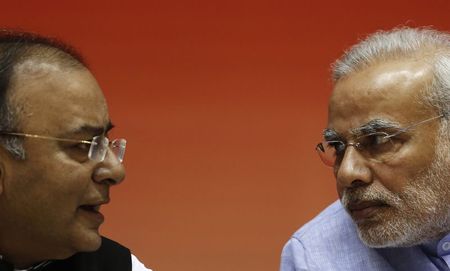By Rajesh Kumar Singh
NEW DELHI (Reuters) - Clashes along India's border with Pakistan are "extremely serious and provocative" and not conducive to improving relations between the nuclear-armed neighbours, Defence Minister Arun Jaitley said on Saturday.
The comments came nearly two weeks after New Delhi called off top level diplomatic talks, protesting against Pakistan's meetings with separatists from the disputed region of Kashmir.
Exchanges of fire between Indian and Pakistani troops along the Line of Control (LoC) that divides Indian- and Pakistan-controlled Kashmir have intensified in recent weeks, claiming lives of several people, including soldiers.
"The incursions taking place at the border both at the LoC and at the international border are extremely serious and provocative," Jaitley said.
"These are creating an environment which are not being conducive to the relationship of the two countries."
The clashes have further strained ties between the two South Asian countries, which have been at loggerheads over the possession of the Himalayan region of Kashmir since their independence from the British rule in 1947.
The two nations have fought three wars and came close to a fourth war in 2001. There have been regular clashes on the heavily militarised Line of Control.
Hopes of a warmer relationship had risen after Pakistani Prime Minister Nawaz Sharif attended the inauguration of Indian Prime Minister Narendra Modi about three months ago.
Since then relations have deteriorated. Modi on Friday said he was disappointed that Pakistan had made a "spectacle" of the peace efforts.
"We will continue to make efforts to build peaceful, friendly and cooperative ties with Pakistan," he said before leaving for his first state visit to Japan.
"But I might add that any meaningful bilateral dialogue necessarily requires an environment that is free from terrorism and violence."
The Hindu nationalist leader was elected by a landslide in May on promises to restore India's economic and military prowess and meet the security challenge posed by a rising China and long-running tension with Pakistan.
Yet he surprised many observers by inviting South Asian leaders - including Sharif - to his inauguration in a bid to bolster neglected regional ties.
Modi's Bharatiya Janata Party (BJP) advocates pursuing a muscular foreign policy vis-à-vis China and Pakistan. Its election manifesto promised to revise India's nuclear doctrine, whose central principle is that New Delhi would not be first to use atomic weapons in a conflict.

The Indian premier, however, clarified on Friday that his administration was not yet carrying out any review of the doctrine.
(Editing by Rosalind Russell)
